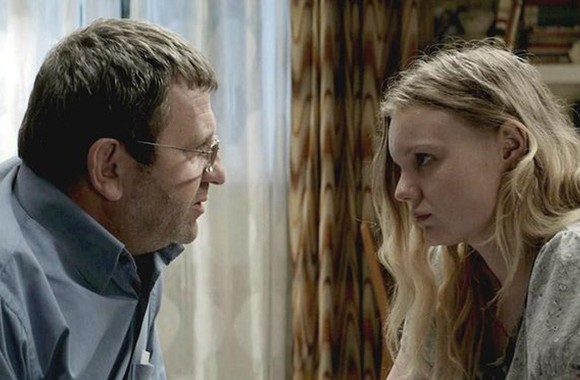The director has a tough act to follow after winning the Palme d'Or in 2007 for his 4 Months, 3 Weeks and 2 Days but with this film which is perhaps his best since his Cannes winner nearly 10 years ago he makes a good run at it.
The story mines familiar territory for Romanian cinema. Romeo Aldea played by Adrian Titieni a 49 year old doctor living in a small town in Transylvania returned to Romania in 1991 after emigrating abroad to escape the Ceausescu regime. But he has regretted it ever since and now his dream is for his daughter Eliza played by Maria Dragus to escape the hopelessness and stultifying corruption of post-Ceausescu Romania by emigrating abroad.
His dream appears to be on the verge of becoming a reality when Eliza a very bright student is offered a scholarship in the UK to study psychology when she turns 18. But she still has to pass her final exams with outstanding marks.
Just as she is preparing for her exams Eliza suffers a brutal attack by a would be rapist. She manages to fight off her attacker but she is deeply shaken by the experience and her ability to concentrate and prepare for the critical exams is thrown into doubt.
Romeo has always believed in living by his principles and has refused to take bribes like other doctors and lives in a dreary and soulless suburb of concrete blocks because of his refusal to profit from the misery of his patients. His one bright hope is for his daughter to escape this grey and stagnant society but when her future is at stake he faces a decision over whether to sacrifice his principles to help his daughter or risk her being trapped in the same life he so much regrets.
Romeo decides to embark on the same path of petty corruption that has dragged down the Romanian society. To ensure that his daughter receives good grades on her exams he agrees to move a local petty official played by Petre Ciubotaru to the top of the waiting list for a liver transplant in return for him agreeing to pull some strings and make sure Eliza’s exams receive favourable results.
The only real cipher in the plot is Eliza who is not sure she even really wants to leave Romania and her boyfriend played by Rares Andrici or that she is ready to go along with faking the exam results. If there is a message here it is that the younger generation of Romanians have a better chance of escaping the endless cycle of corruption and hopelessness that the previous generation did.
Mungiu is a master and the film is full of subtle scenes and he makes his points points effortlessly. He works with cinematographer Tudor Vladimir Panduru who replaces Mungiu’s usual DoP Oleg Mutu and we often see characters from the backs of their heads for whole scenes. While this device might be pretentious in some director’s hands in Mungiu’s the works as intended.
This looks like the work of one of the acknowledged masters of the Romanian New Wave at the height of his game and is sure to see wide-spread festival awards and screenings.
Graduation / Bacalaureat (Romania, France, Belgium)
Directed by Cristian Mungiu
Produced by Mobra Films
Coproduced by Why Not Productions, Les Films du Fleuve, France 3 Cinéma
Supported by the Romanian National Film Centre (CNC), Eurimages
Cast: Adrian Titieni, Maria Dragus, Lia Bugnar, Mǎlina Manovici, Vlad Ivanov




















